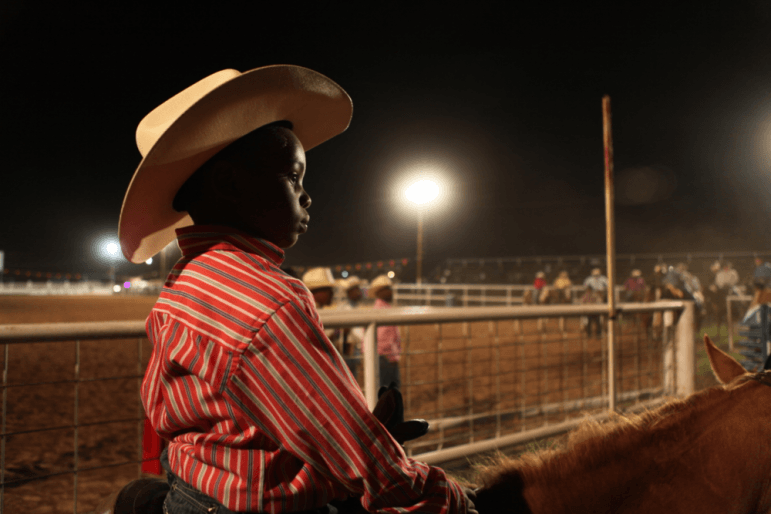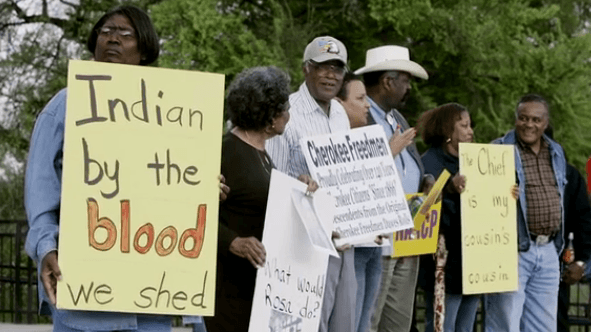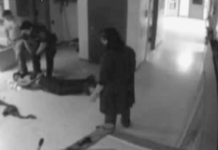Tribal rights of Black Native Americans explored in new documentary
 (Photo courtesy of World Channel)
(Photo courtesy of World Channel)A decades-long “epic civil rights battle” between one of the wealthier Native American tribes and its descendants is highlighted in a documentary on public television later this month.
America ReFramed, the weekly series that features documentaries and short films on the PBS World channel, concludes its fourth season with the November 15 national television and online premiere of By Blood (2015). The show reveals how in Oklahoma, Black Native Americans known as Freedmen have been denied their full tribal rights by the Cherokee Nation who argue that they are not members “by blood.”
When the Cherokees and other Native Americans were forced to move west by the U.S. government in the early 19th century, “countless slaves followed them into the frontier, bound and shackled,” explains the film’s press release. After slavery was banned, the Cherokee Nation granted “perpetual freedom and full tribal membership to Cherokee slaves and their descendant — the “Freedmen.”
However, tribal leaders over a decade ago successfully argued to deny tribal rights to Freedmen descendants, who mostly live in Tulsa, and the two sides have been in a legal battle ever since. The film takes a historical look at how federal policies played a huge part in the issue, and includes interviews with several Freedmen descendants, Cherokee leaders, civil rights advocates and others. The “the divisive legacy of racial classification by the one-drop rule” is also examined.
The story of Native Americans as slave owners “hasn’t been told,” states Marcos Barbery, who produced and co-directed the film. He became aware of the issue about five years ago, and became “obsessed” in finding out more about it.
“The idea that some Native American tribes did hold African slaves — it is wild that this hasn’t had a light shone on it,” adds Co-Director Sam Russell.
He and Barbery last week talked about their film in a MSR phone interview. With the Standing Rock protests now in the news, the Freedmen issue might get some attention as well, predict the filmmakers. “Their ancestors contributed to the tribe in all kinds of ways,” reiterates Russell on the Freedmen, who proudly see themselves as Cherokee who only want what all Cherokee people in Oklahoma have — full tribal rights.
___________________________________________________________________________________________________
“Sam and I have talked to many experts who say that these Freedmen, in many cases, have more American Indian blood in them than those within the tribe who are kicking them out.”
___________________________________________________________________________________________________
“There seems to be a lot of misinformation out there,” continues Russell. “Not everybody in Oklahoma in the Cherokee territory know about the Freedmen, and if they do, a lot of times there is this perception that they are just showing up now and interested in benefits, but have no real connection to the tribe. That is not what we found.”
The story “is a broader context of race in America,” states Barbery, who wants viewers to really see “the pain people feel when they are excluded. I think this is really a story about how politicians essentially use race as a wedge issue to create this division within their tribe.
“This is the second most populous American Indian tribe, and here they are operating in ways that are really divisive to gain votes. The Cherokee Freedmen are some of the most venerable people as a population in the United States,” he points out.
“Their ancestors have experienced everything that American Indians ancestors have experienced, and on top of that, their families were slaves to American Indians. I feel that special attention should be given to them.
“I think what the Cherokee Nation has shown is that they are willing to subscribe to that same kind of political play-off” which often employs the “this class of people don’t belong — they are not part of us” mentality, contends Barbery. Tribal leaders used this “in order to win votes. The votes they are winning are a very small portion of the population within the Cherokee Nation. Most people who voted to keep the freedmen out were misinformed. People didn’t know this was happening,” notes the filmmaker.
“Sam and I have talked to many experts who say that these Freedmen, in many cases, have more American Indian blood in them than those within the tribe who are kicking them out,” states Barbery.
Adds Russell, “This case has gotten lost in the courts. Who knows when a decision will come down? They have been waiting two-plus years now. Ultimately, it is up to the Cherokee people to pressure their leaders to do the right thing, and do right by the Cherokee Freedmen.”
Both filmmakers say By Blood has been positively received by audiences at many film festivals around the country. “We’ve had very positive feedback from the Freedmen and their advocates,” says Russell. “The freedmen were happy to see a well thought-out and in-depth story about their plight. A lot of people are shocked after seeing the film and learning about the issue,” he said.
“We want the film to be seen as much as possible, and hope that it will contribute to the conversation in a meaningful way,” concludes Russell.
The PBS World channel is not available locally but can be seen online at worldchannel.org. By Blood will premiere Tuesday, November 15 , at 7 pm. The broadcast will be followed by streaming for audiences across the U.S. at www.worldchannel.org/americareframed starting on November 16. Other show times: November 19, 9 pm; November 20, 1 am. All times are CST.
Charles Hallman welcomes reader responses to [email protected].










